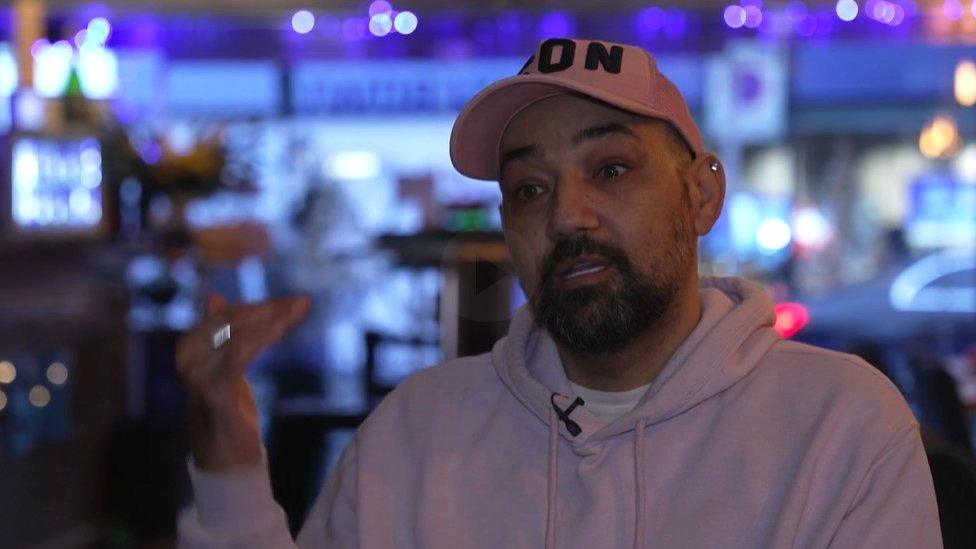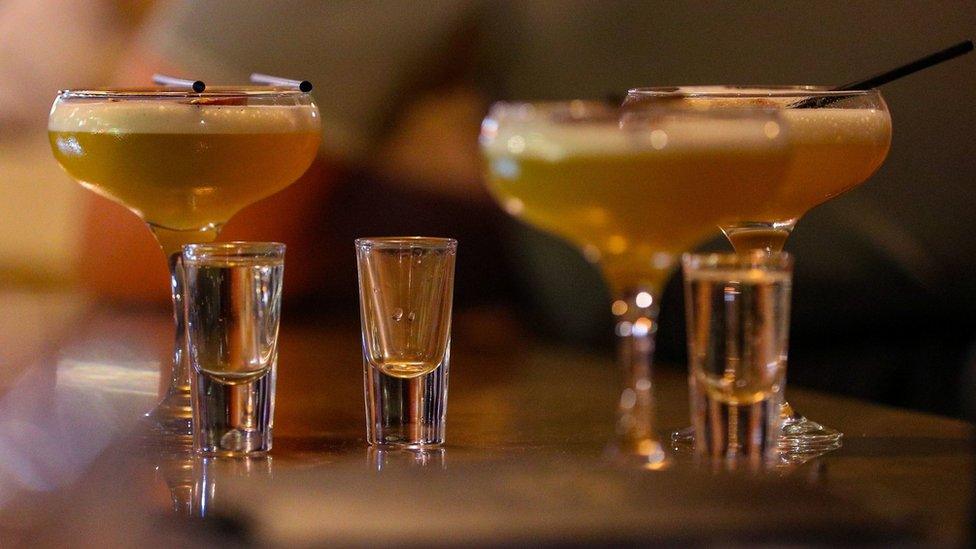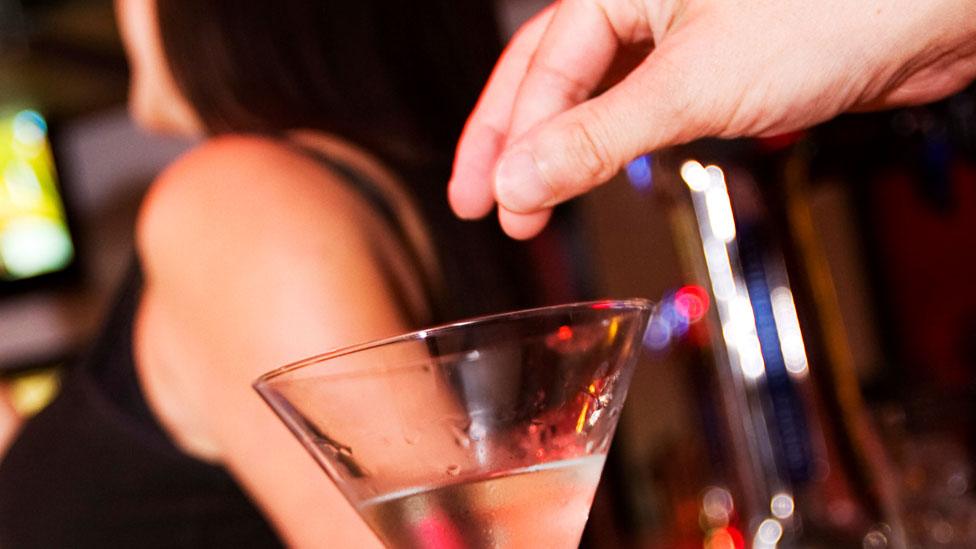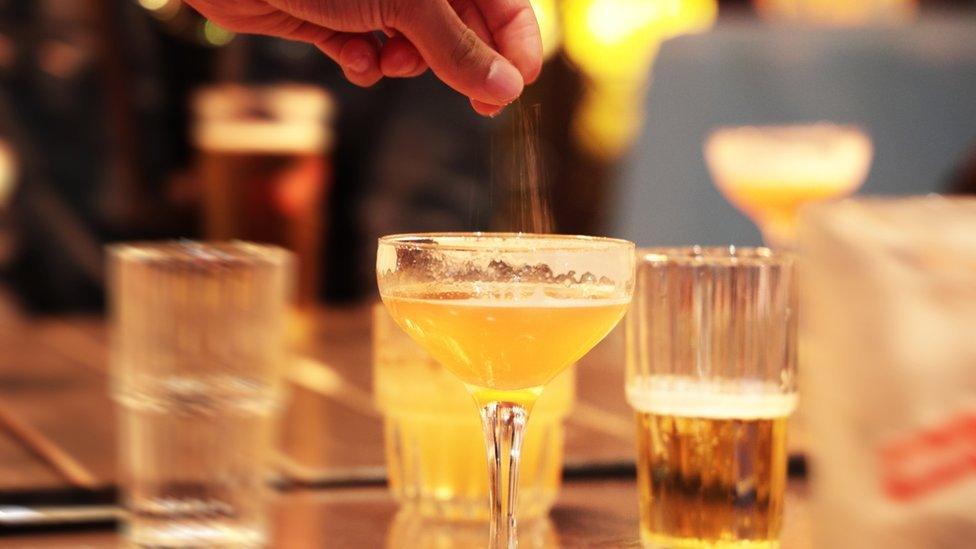London drink-spiking offences quadruple in five years - Met Police
- Published

Stephen Hart had his drink spiked with rohypnol in 2006 and says he woke up covered in blood
Drink-spiking offences have more than quadrupled in London over five years, according to Metropolitan Police data.
At the beginning of 2018 there were 497 recorded offences, rising to 2,066 by the end of 2022.
The Home Office announced measures on Monday intended to address spiking.
Stephen Hart is London ambassador for the charity Stamp Out Spiking and was himself a victim. He says it "felt like I closed my eyes for a second" in a bar before waking covered in blood.
He says when he awoke the sun was streaming through a nearby window. "It had been 10 o'clock at night in October and then suddenly it was sunny.
"I was confused and disorientated: shivering, sweating. When I got up to have a shower it was clear I had been sexually assaulted," he said.
"I had been out with a friend at a bar in north London. It was a simple, normal night and my friend had to leave early because his girlfriend had phoned. I stayed to finish my drink and I was just minding my own business."
Mr Hart described feeling suddenly dizzy and confused in the bar, knowing that he needed help but being unable to verbalise it, before being "woken up by the sun shining" through the window.
His said his clothes were bloody and that he was later diagnosed with HIV.
'How can you not remember?'
"My rum and diet coke had been sitting on the bar beside me while I was talking to my friend," said Mr Hart. "It is assumed now that rohypnol was put into my drink while I was sitting there and I didn't see it happen. I wonder: if I'd looked at the glass, would I have noticed?
"It just made me feel completely confused. Because when you think of something like rape, how can you not remember? How can you not be able to put a face to the person who did this to you? But I couldn't."
Mr Hart said that because he speaks in public about the attack he is contacted by others who have had a similar experience - particularly other men.

The Home Office has plans to update the law on spiking
Spiking is defined as putting alcohol or drugs into another person's drink or body without their consent and commonly involves the substances GHB (short for gamma-hydroxybutric acid) or rohypnol.
Mr Hart continued: "These days the drugs are usually liquids, so there isn't even the possibility of seeing something dissolving in your glass. And there are also vapes being spiked, then offered around. Also injections: people being stabbed with needles by people walking past. It's a worldwide problem."
'Recognise the symptoms'
The Home Office this week announced a package of measures intended to address spiking in England and Wales, including more training for door staff and funding for testing kits.
Mr Hart said he was pleased that Home Secretary James Cleverly and other MPs were acting on the issue.
"But training is essential for bar staff, door staff, bus drivers, taxi drivers: people who could recognise the symptoms because often you can't do anything yourself."
He says that it is also easy to mistake someone whose drink has been spiked for someone who is extremely drunk. "You can see why police and ambulance workers would be judgemental. But they need to be aware that it could be that the person's drink has been spiked."
Unmesh Desai, a Labour member of the London Assembly, who requested the Met Police statistics, said, external: "I urge the police to try to bring more prosecutions.
"The Met are trying to rebuild trust and confidence in their work, especially from women and the LGBTQ+ community - groups we know are disproportionately targeted by drink-spikers."

Listen to the best of BBC Radio London on Sounds and follow BBC London on Facebook, external, X, external and Instagram, external. Send your story ideas to hello.bbclondon@bbc.co.uk
- Published17 December 2023

- Published11 January 2023
